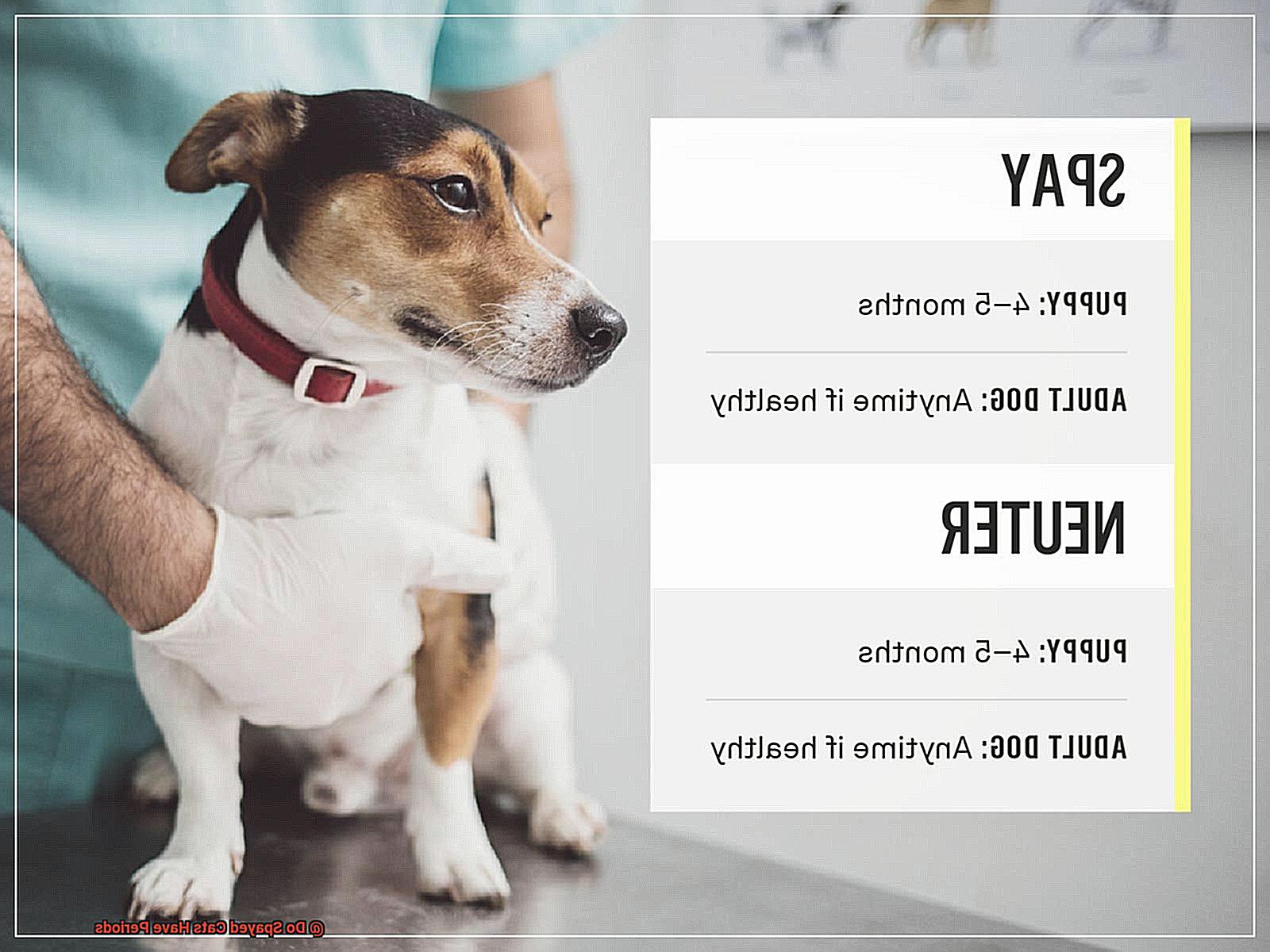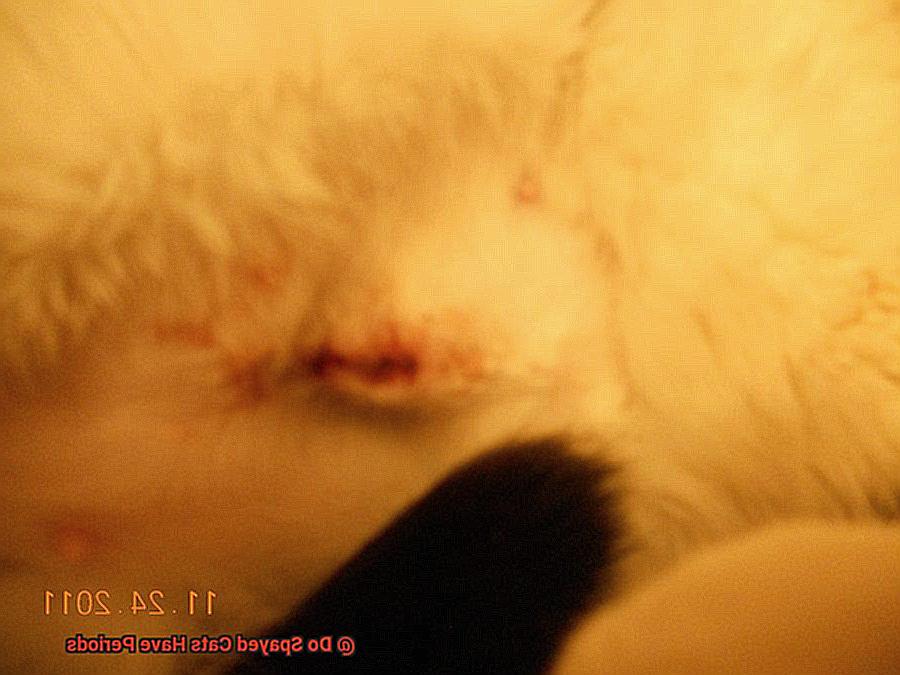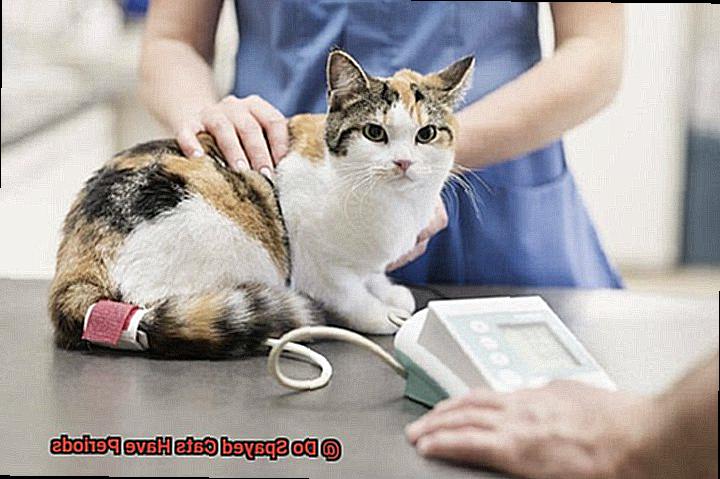Do you have a spayed cat that’s been acting strangely lately?
Or are you considering spaying your feline friend but wondering if they’ll still go through periods? Fear not, as we’re here to answer the burning question: “Do spayed cats have periods?”
First off, let’s define what a ‘period’ means for cats. It’s the time when a female cat is in heat, and her body prepares for potential mating.
During this period, cats become more vocal, scratch furniture, and may even spray urine to indicate their readiness to mate. However, if your cat has been spayed, she won’t have any periods anymore.
Spaying involves removing the ovaries and uterus, which eliminates the hormonal changes that cause periods. This means your cat will be spared from the physical and emotional changes that come with being in heat.
But don’t be surprised if your spayed cat still displays behaviors similar to when they were unspayed. These actions are more of an instinctual response than actual periods.

So the answer is a resounding NO. Spayed cats do not have periods.
So let’s dive right in.
Common Misconception: Do Spayed Cats Have Periods?
Let’s set the record straight once and for all.
Spaying is a surgical procedure that removes a female cat’s ovaries and uterus. By doing this, a cat can no longer reproduce and is protected from reproductive diseases.
However, what spaying cannot do is give cats periods. Why?
Well, cats do not menstruate like humans and primates do. The shedding of the uterine lining in preparation for pregnancy is the primary cause of menstruation.
Since a spayed cat’s uterus has been removed, there is no lining to shed. Therefore, there can be no menstrual cycle.

However, don’t be fooled by spotting or discharge from your spayed cat’s genital region. This could indicate an underlying health issue such as an infection, fracture, or urinary tract disorder.

If you notice any bleeding or discharge, it’s important to take your cat to the vet for a check-up. Additionally, some spayed cats may exhibit behaviors that are often mistaken for heat.
An unspayed cat is fertile and ready to mate due to the hormones produced by the ovaries during heat. However, after being spayed, these hormones are no longer produced.
Nevertheless, some cats may continue to show affectionate or agitated behavior during phantom heat cycles. In conclusion, spayed cats do not have periods because their reproductive organs have been surgically removed.
If you notice any abnormal bleeding or discharge from your cat, it’s important to take them to the vet for an evaluation.
Causes of Bleeding or Discharge in Spayed Cats

There are several reasons why this could be happening, and the majority of them are treatable.
Firstly, it’s crucial to understand that spayed cats do not have periods. They have had their reproductive organs removed, so any bleeding or discharge is not related to menstruation.
However, a common cause of these symptoms is a vaginal infection. These infections can be caused by bacteria or fungi, leading to inflammation and irritation of the vaginal tissues, which in turn causes bleeding or discharge.
Trauma to the genital area is also a potential cause of bleeding or discharge. A cat fight, accidental injury, or even rough play can result in cuts, scrapes or bruises in the genital region which may become infected and cause bleeding or discharge.
Spayed cats are also at risk of urinary tract infections, which can cause blood in urine or discharge from the vagina. These infections can be painful and uncomfortable for your furry friend, so it’s best to get veterinary assistance as soon as possible.
Lastly, some spayed cats may develop tumors or cysts that cause bleeding or discharge. These growths may be present in the vagina, uterus, or other organs of the body.
Although this is less common than the other conditions we’ve discussed, it’s still essential to have any unusual signs checked out by a veterinarian to rule out any significant underlying disorders. In conclusion, spayed cats may suffer from bleeding or discharge for various reasons; therefore, it’s vital to closely monitor your pet’s behavior and seek veterinary care if you notice any unusual symptoms.
Remember, early intervention can often prevent more serious health problems down the line.
Phantom Heat in Spayed Cats
Phantom heat, also known as pseudocyesis, false pregnancy, or pseudopregnancy, occurs when some spayed cats display signs of being in heat. Although this phenomenon can be alarming to pet owners, it’s important to know that it’s harmless and will typically resolve on its own.
But what causes phantom heat? When a female cat goes into heat, her body prepares for potential mating and pregnancy by releasing hormones that cause changes in behavior and physical appearance.
Spaying a cat involves removing the ovaries and uterus, which eliminates the source of these hormones. However, in some cases, the brain continues to produce hormones that mimic those of heat, causing the cat to display signs of being in heat.
Symptoms of phantom heat can vary from cat to cat. Some cats may become more vocal and affectionate, while others may exhibit behaviors similar to those of pregnant cats such as nesting or carrying around toys as if they were kittens.
Physical symptoms can include swollen nipples, increased appetite, and even milk production. It’s important to note that not all spayed cats will experience phantom heat.
The likelihood of this condition occurring depends on several factors, such as the age at which the cat was spayed and individual hormonal differences. If your spayed cat displays symptoms of phantom heat, there’s no need for concern.
This condition is harmless and will typically resolve on its own within a few weeks. However, if your cat seems uncomfortable or distressed, you can provide extra attention and comfort to help her through this period.
By understanding this phenomenon, you can provide your furry feline with the care she needs during this time.
The Benefits of Spaying Your Cat
Spaying your cat has numerous advantages for both you and your feline friend.
First and foremost, spaying eliminates the risk of certain types of cancer, such as ovarian and uterine cancer. Additionally, spayed cats are less likely to experience mammary gland tumors, which can be malignant in about 90% of cases.

By taking preventative measures early on, you can help ensure that your cat lives a long and healthy life. But that’s not all.
Spaying can also improve your cat’s behavior. Female cats that are not spayed may experience mood swings and become aggressive during their heat cycles.
They may also engage in territorial marking behavior or try to escape in search of a mate. Spaying can reduce or eliminate these behavioral issues, making life easier for you and your furry friend.
Furthermore, spaying can save you money in the long run. Unspayed female cats are at risk for developing infections or complications during pregnancy and birth, which can result in costly veterinary bills.
Additionally, unspayed cats that engage in territorial marking behavior may cause damage to your home or belongings, resulting in expensive repairs or replacements. In conclusion, spaying your cat is a responsible decision that can improve both the quality of life for your feline friend and yourself.
By eliminating health risks and behavioral problems early on, you can ensure that your cat lives a healthy and happy life for years to come.
When to Take Your Cat to the Vet

Regular check-ups with your vet are recommended, but there are certain signs and symptoms that you should never ignore.
These include changes in appetite, lethargy, vomiting, diarrhea, difficulty urinating or defecating, and any unusual behavior. If you have a spayed cat and notice bleeding or signs of a period, it’s crucial to act quickly by taking them to the vet.
While spayed cats don’t have periods, bleeding could be a sign of infection, tumors, or injury. It’s like seeing a red flag waving in front of you – a clear indication that something is wrong and needs attention right away.
Furthermore, if your spayed female cat is displaying behaviors resembling being in heat such as vocalization, restlessness, and excessive grooming, it may be an indication of an underlying medical condition. Taking them to the vet for a check-up and potential treatment can help detect any issues early on.
It’s like going to the mechanic when you hear a strange noise in your car – addressing the issue before it becomes more significant will save you time and money. Regular check-ups and preventative care with your vet can help avoid future health issues and ensure your cat is in good shape.
Just like getting routine maintenance for your car or going to the dentist, preventative care for your cat will save you money and relieve anxiety in the long run. In conclusion, knowing when to take your cat to the vet is crucial for their overall health and wellbeing.
Remember, you are your cat’s biggest advocate, and they rely on you to keep them healthy and happy.

Tqp2Ob3Qm94″ >
How to Care for a Spayed Cat
Spaying is a common surgical procedure that offers many benefits for your cat’s health and wellbeing. However, you must take proper care of your spayed cat to ensure a smooth recovery and long-term health. Here are five essential tips for caring for your spayed cat:
Monitor the Incision Site
After the surgery, your cat will need time to recover. Your veterinarian will provide specific instructions on how to care for your cat’s incision site, which is a crucial element of their recovery.
Make sure to keep the area clean and dry, and watch for any signs of infection such as redness, swelling, or discharge. Your cat may also need to wear an Elizabethan collar to prevent them from licking or scratching the wound.
Manage Your Cat’s Diet and Exercise
Spayed cats have a slower metabolism and are more prone to weight gain than unspayed cats. Therefore, it’s important to monitor their diet and exercise routine to maintain a healthy weight.

Consult with your veterinarian about the best feeding options suited to your cat’s needs and make sure they get enough physical activity. Interactive playtime with toys is an excellent way to keep your spayed cat active and engaged.
Regular Veterinary Check-ups and Vaccinations
While spaying can reduce the risk of certain health issues, it’s still vital to stay on top of preventative care. Schedule regular check-ups with your veterinarian and keep up with vaccinations to ensure your cat stays healthy. Your veterinarian can also advise you on preventive measures for fleas, ticks, and other common parasites.
Emotional Well-being
Spayed cats may experience behavioral changes such as increased aggression or anxiety due to hormonal changes after surgery. To help them maintain their emotional stability, provide them with plenty of toys and opportunities for play and mental stimulation. If you notice any significant changes in their behavior or mood, consider consulting with a veterinarian or animal behaviorist.

Be Vigilant About Their Overall Well-being
Even after spaying, your cat is still vulnerable to common health issues such as urinary tract infections or dental problems. Therefore, it’s essential to stay vigilant and seek veterinary attention when needed.
Watch for any signs of illness, such as loss of appetite, lethargy, or unusual behavior.
So, caring for a spayed cat involves monitoring their incision site, managing their diet and exercise regimen, staying up-to-date on vaccinations and preventative care, assuring their emotional stability, and being vigilant about their overall wellbeing. By following these tips, you will help ensure that your spayed cat is healthy and happy for years to come.
Also Read: Do Spayed Female Cats Still Have The Urge To Mate?
Conclusion
In conclusion, the question of whether spayed cats have periods can be answered with a resounding NO.
Spaying involves removing a female cat’s ovaries and uterus, which eliminates the hormonal changes that cause periods. However, it’s important to remember that instinctual behaviors may still persist in spayed cats.
If you notice any unusual bleeding or discharge from your spayed cat, don’t hesitate to bring them to the vet for an evaluation. Although spayed cats do not have periods, these symptoms could indicate an underlying health condition such as an infection, fracture, or urinary tract disorder.
Spaying your cat offers numerous benefits for both you and your feline friend. It reduces the risk of certain types of cancer while also decreasing behavioral problems such as mood swings and aggression during heat cycles.
Caring for a spayed cat requires monitoring their incision site, maintaining a balanced diet and exercise regimen, staying up-to-date on vaccinations and preventative care, ensuring their emotional stability, and being vigilant about their overall wellbeing.







